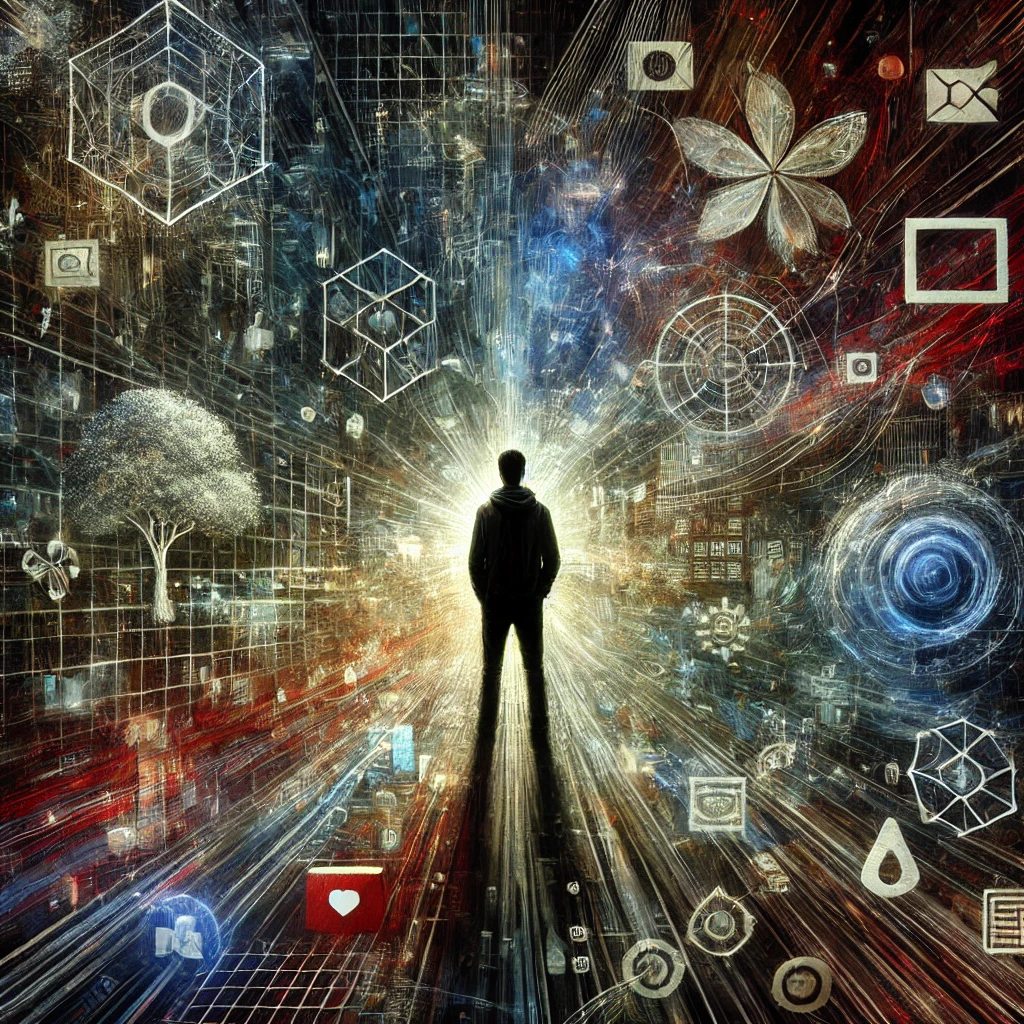
“A lone figure with a penetrating gaze amid a chaotic digital landscape, representing the power of discernment to cut through the noise of information overload.”
Discernment: A Survival Skill in the Information Age
In the Information Age, where truth and deception blur into barely distinguishable shadows, discernment is no longer optional—it’s essential. Discernment in the Information Age empowers us to filter, question, and take control of the endless flow of digital content flooding our lives. Without it, we become fodder for manipulation, wandering through a maze of agendas, algorithms, and curated realities, half-aware of the forces guiding us.
“In a world designed to overwhelm and mislead, discernment is more than a skill; it’s survival itself.”
Discernment is the foundation of a mind that doesn’t merely consume information but filters, questions, and ultimately owns it. In this digital age, where manipulation is the default and misinformation is rampant, discernment transforms from a luxury into an indispensable survival skill.
What Is Discernment in the Information Age?
Discernment is an ancient skill that once marked sages, philosophers, and mystics. It is the ability to see beyond appearances, detect subtle truths, and resist surface-level distractions. In ancient times, discernment was a contemplative pursuit—an act of deep thinking and observation. It demanded questioning, analyzing, and reflecting rather than absorbing passively.
Discernment in Ancient Traditions
Across cultures, discernment was seen as the cornerstone of wisdom:
- Socratic questioning in ancient Greece trained the mind to dismantle assumptions.
- Buddhist mindfulness taught practitioners to see reality as it is, free from distortion.
- Stoic contemplation emphasized separating external noise from internal truths.
Discernment as Mental Self-Defense
Today, discernment is less about contemplation and more about protection. Social media, clickbait, and endless digital content have transformed discernment into a shield against information warfare. Failing to cultivate discernment leads to:
- Susceptibility to False Narratives: Falling prey to misinformation and propaganda.
- Cognitive Overload: Mental fatigue caused by endless choices and data streams.
- Loss of Autonomy: Surrendering control of thoughts and beliefs to algorithms and manipulative forces.
“In a world of information warfare, discernment becomes a shield against cognitive overload and persuasion.”
Psychological Impacts of Failing to Discern
Without discernment, the mind becomes vulnerable to biases, manipulation, and groupthink. Echo chambers and ideological silos corrode individual thought, leading to:
- Loss of critical thinking.
- Blind acceptance of curated realities.
- An erosion of personal identity.
How Discernment Protects Your Mind in a Misinformation-Filled World
We live in an age of information abundance, where access to data is nearly limitless. But for every valuable piece of information, there are ten distractions competing for our attention. This phenomenon, known as information overload, wreaks havoc on our ability to process, prioritize, and act thoughtfully.
The Psychological Toll of Information Overload
When the volume of information exceeds our mental capacity to process it, we enter a state of cognitive overload. Symptoms include:
- Fractured Focus: The inability to concentrate or retain information.
- Choice Paralysis: Anxiety and indecision caused by too many options.
- Passivity: Relying on algorithms to “curate” reality, outsourcing critical thinking to technology.
“Modern algorithms don’t just deliver information; they craft it to capture and hold your attention. Discernment allows you to reclaim mental clarity.”
Key Subpoints
- Algorithms and Manipulation: Platforms like social media prioritize content designed to exploit emotions, amplify outrage, and reinforce biases. Discernment helps recognize and resist these manipulative designs.
- Choice Fatigue: The endless flow of recommendations—news articles, videos, and advertisements—exhausts our willpower. Discernment allows us to separate meaningful choices from distractions.
- The Paradox of Infinite Choices: With infinite options, clarity diminishes. Discernment acts as a map, guiding us toward what truly matters.
Cutting Through Digital Noise: The Power of Discernment
Not all information is created equal. Between every meaningful fact lies a sea of distractions, half-truths, and emotionally charged headlines designed to divert attention. Discernment equips us to cut through the noise and identify the “signal”—the information that matters.
Techniques to Sharpen Discernment
- Recognizing Manipulation Tactics:
- Watch for emotional hooks, authority bias, and selective framing in news stories. These are designed to bypass critical thought and elicit impulsive reactions.
- The Art of Cross-Referencing:
- Truth rarely resides in a single source. Triangulate information by consulting multiple reputable sources to uncover patterns and agendas.
- Spotting Red Flags:
- Sensationalized headlines, lack of citations, and vague claims are hallmarks of misinformation. Develop a watchful eye to identify these red flags.
“In a sea of distractions, discernment helps us locate the signal—the knowledge that feeds rather than drains.”
Why Discernment in the Information Age Is the Ultimate Survival Skill
In the digital battlefield of ideas, ignorance isn’t just a lack of knowledge—it’s a vulnerability. Today’s propaganda wears the guise of “content,” and hidden agendas are embedded in “news.” Without discernment, individuals risk becoming pawns in a larger game of influence and manipulation.
“Discernment isn’t about rejecting everything; it’s about critically engaging with what you choose to accept.”
The Manipulated Mind
A mind without discernment can be led to:
- Belief in False Narratives: Accepting conspiracy theories or propaganda without question.
- Acting Against Self-Interest: Falling victim to manipulative marketing or political ideologies.
- Loss of Critical Thought: Abandoning rationality in favor of ideological loyalty.
The discerning mind, by contrast, sees through manipulation, retains autonomy, and thrives in the face of deception.
Practical Tips for Sharpening Discernment in Today’s World
Discernment isn’t innate—it’s a skill that can be cultivated through practice and intentionality. Here are practical steps to develop discernment:
- Mindful Consumption:
- Approach information with focus and intention. Curate your sources carefully and avoid mindless scrolling.
- The 5-Source Rule:
- Before forming a strong opinion, consult at least five reputable sources. Look for patterns, contradictions, and underlying motives.
- Pattern Recognition:
- Identify recurring manipulation tactics in media, advertising, and political messaging. Over time, you’ll develop an instinct for what’s genuine.
- Daily Practice of Skepticism:
- Question everything. Ask who benefits from a narrative, examine evidence, and avoid knee-jerk emotional reactions.
“Discernment isn’t about rejecting information—it’s about owning your mental process and engaging with the truth critically.”
DARWIN’s Take: The Battle for the Mind
Discernment isn’t just a tool; it’s a weapon in the war for your mind. In this era of information overload, where truth fights for breath beneath a tidal wave of noise, discernment separates the free thinkers from the manipulated masses. It’s not just about spotting the lies—it’s about resisting the subtle nudges that steer you away from critical thought, convincing you to trust the algorithms, the curated feeds, and the seductive comfort of groupthink.
The truth is, no one’s coming to save you from the deception. Social media platforms profit from your outrage, news outlets thrive on your clicks, and advertisers depend on your emotional triggers. They’re not interested in your clarity; they’re invested in your confusion. Discernment, then, isn’t a luxury—it’s an act of rebellion.
But discernment doesn’t mean cynicism. Rejecting everything is as lazy as believing everything. True discernment requires effort: questioning, cross-referencing, and pausing long enough to think in a world that demands instant reaction. It’s about reclaiming the sovereignty of your mind, inch by inch, from the forces that profit from its fragmentation.
So ask yourself: How much of your reality do you truly own? What was the last headline you trusted without question? Who stands to benefit from your belief? If you don’t know the answers, it’s time to sharpen your discernment—or risk living in someone else’s version of the truth.
In the end, discernment isn’t just survival—it’s freedom.
Conclusion: A Call to Clarity
Clarity has never been more valuable—or more difficult to attain. In a world where confusion is profitable and distraction is designed, discernment is a radical act of autonomy. To cultivate discernment is to reclaim control over your mind, to reject illusions, and to live deliberately.
“Discernment asks you to challenge not only the world but your own mind. Embrace it, and you’ll stand clear in a murky world.”
Those who choose discernment will navigate the noise with purpose and clarity. Those who neglect it will be led by someone else’s vision. So ask yourself: Which reality will you choose to live in?
Further Reading on Paranoid Prophet
- Historical Evidence for Jesus – Explore how discernment is essential when evaluating historical claims, like the evidence for Jesus’s life.”
- Who Was Jesus: Liar, Lunatic, or Lord? – “Discernment also plays a vital role in exploring questions about Jesus’s identity.”
- Prophecies About Jesus’s Ministry –“Prophecies require careful interpretation, a skill developed through discernment.”
Sources for Further Reading
To explore more about the importance of discernment in the Information Age, here are some trusted sources that provide deeper insights:
- Misinformation and Digital Literacy
- Shorenstein Center on Media, Politics, and Public Policy (Harvard Kennedy School)
- Explore research and strategies for combating misinformation and fostering critical digital literacy skills.
- https://shorensteincenter.org/
- Public Trust in Media
- Pew Research Center – Public Trust in Media Report
- Access data and reports about public skepticism toward media and the challenges of misinformation in today’s digital landscape.
- https://www.pewresearch.org/topics/media/
- Strategies to Combat Misinformation
- MIT Technology Review – How to Spot Misinformation Online
- Learn actionable tips for identifying and avoiding misinformation online, including ways to verify sources.
- https://www.technologyreview.com/
- Disinformation Tactics and Trends
- FactCheck.org – Tackling Disinformation
- Understand how disinformation spreads and how to critically evaluate news and online claims.
- https://www.factcheck.org/
FAQ Section: Discernment in the Information Age
1. What Is Discernment in the Information Age?
Discernment in the Information Age is the ability to critically analyze, filter, and verify information in a world overwhelmed by digital content and misinformation. It involves recognizing manipulative tactics, questioning the validity of sources, and making informed decisions to avoid being misled.
2. Why Is Discernment Important in the Digital Age?
Discernment is essential in the Digital Age to navigate misinformation, combat cognitive overload, and maintain autonomy over your thoughts. Without it, individuals are at risk of falling prey to false narratives, echo chambers, and the manipulative designs of algorithms and clickbait content.
3. How Can I Develop Discernment in the Information Age?
Developing discernment requires:
- Practicing mindful consumption of information.
- Cross-referencing multiple credible sources.
- Questioning emotional or sensationalized headlines.
- Limiting exposure to echo chambers and biased content.
By honing these skills, you can learn to separate valuable information from distractions.
4. What Are the Consequences of a Lack of Discernment?
Failing to practice discernment can lead to:
- Belief in misinformation and conspiracy theories.
- Increased anxiety and decision fatigue due to cognitive overload.
- Vulnerability to manipulation by algorithms, advertisers, and biased media.
Discernment acts as a defense against these risks, ensuring mental clarity and informed decision-making.
5. How Does Misinformation Spread in the Information Age?
Misinformation spreads rapidly due to social media algorithms that prioritize engagement over accuracy. Emotional headlines, authority bias, and selective framing manipulate audiences, often amplifying false narratives and creating echo chambers.
6. Can Discernment Help Combat Misinformation?
Yes, discernment is the key to combating misinformation. It empowers individuals to recognize red flags, question sources, and analyze content critically. By fostering discernment, you can reduce the influence of deceptive narratives and promote truth-based decision-making.
7. What Role Do Algorithms Play in Information Overload?
Algorithms curate content designed to maximize engagement, often by amplifying sensational or emotionally charged material. This leads to information overload and skews perceptions of reality. Discernment allows individuals to identify these tactics and regain control over their media consumption.
8. How Does Discernment Differ from Skepticism?
Discernment involves critical thinking and evaluating information with intention, while skepticism often implies a blanket distrust of information. Discernment seeks understanding and clarity, whereas unchecked skepticism can lead to cynicism and rejection of credible facts.
9. Are There Practical Tools to Improve Discernment?
Yes, you can improve discernment using tools such as:
- The 5-Source Rule: Verify claims across at least five reputable sources.
- Pattern recognition to identify manipulation tactics.
- Mindful media consumption by setting limits on screen time and curating trusted sources.
10. How Does Discernment Protect Mental Clarity?
Discernment shields mental clarity by reducing cognitive overload and filtering out unnecessary noise. It helps focus on meaningful information while rejecting distractions, allowing for better decision-making and emotional well-being in a chaotic digital world.


